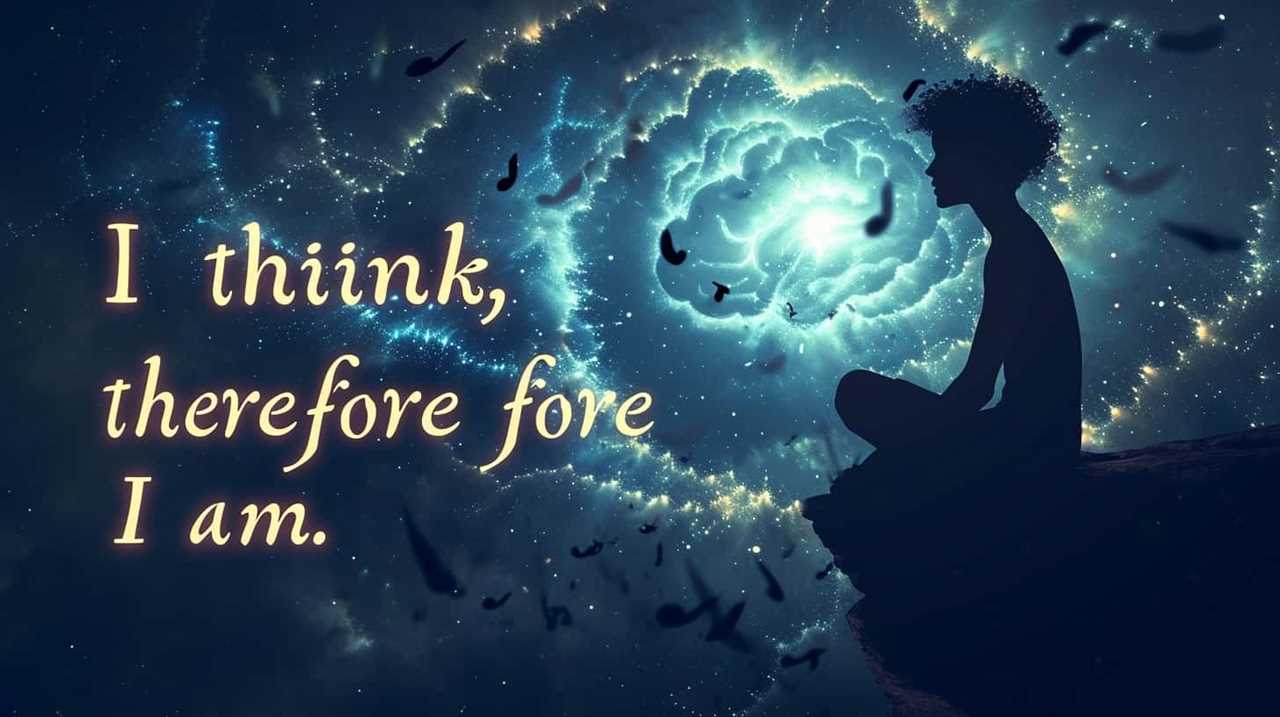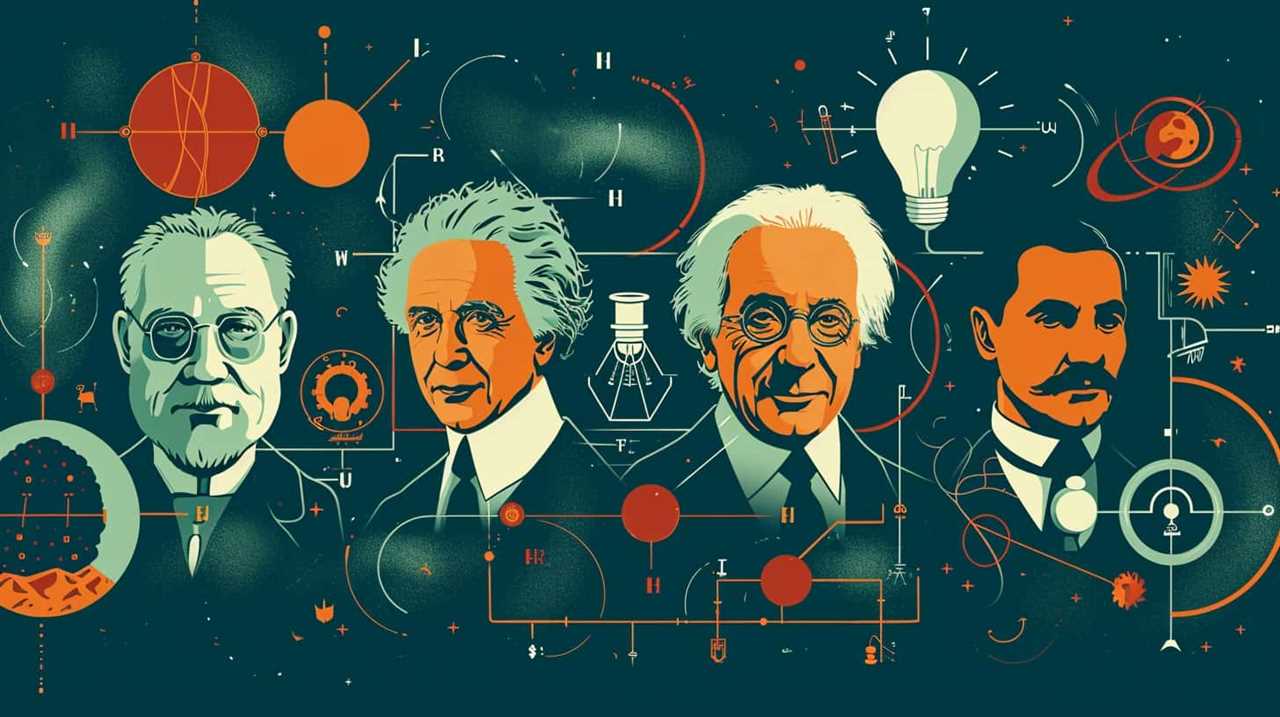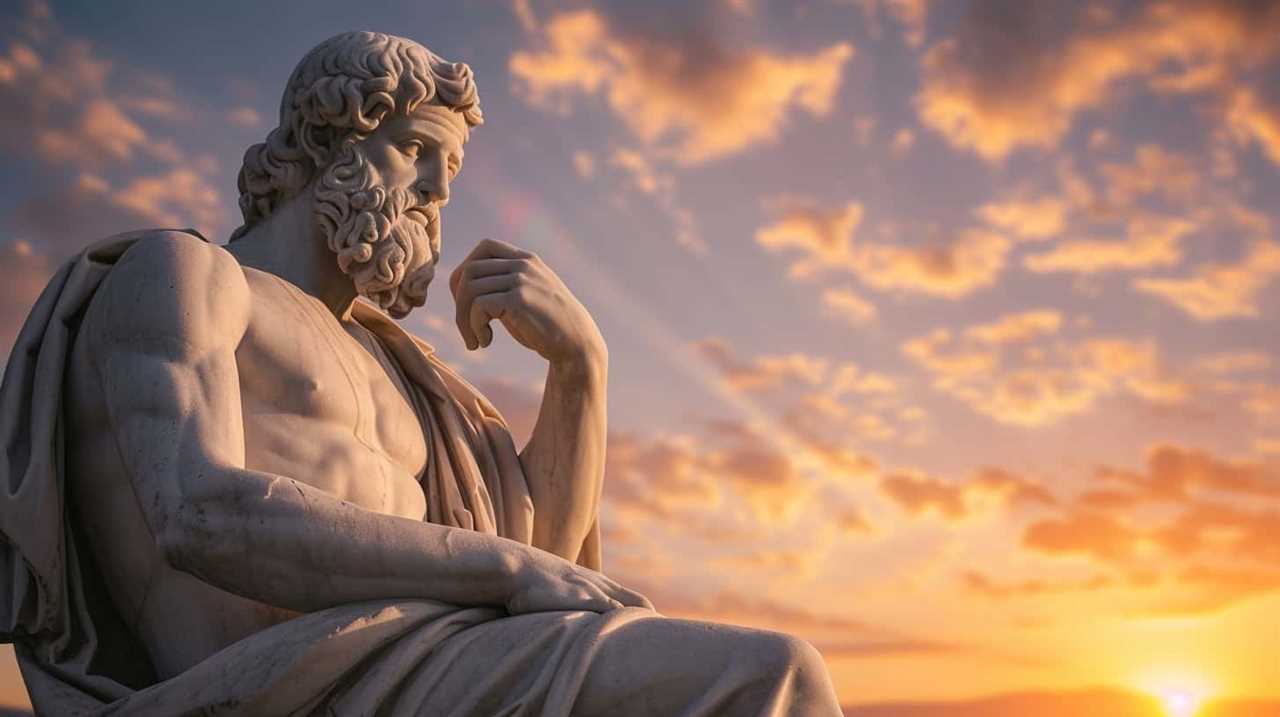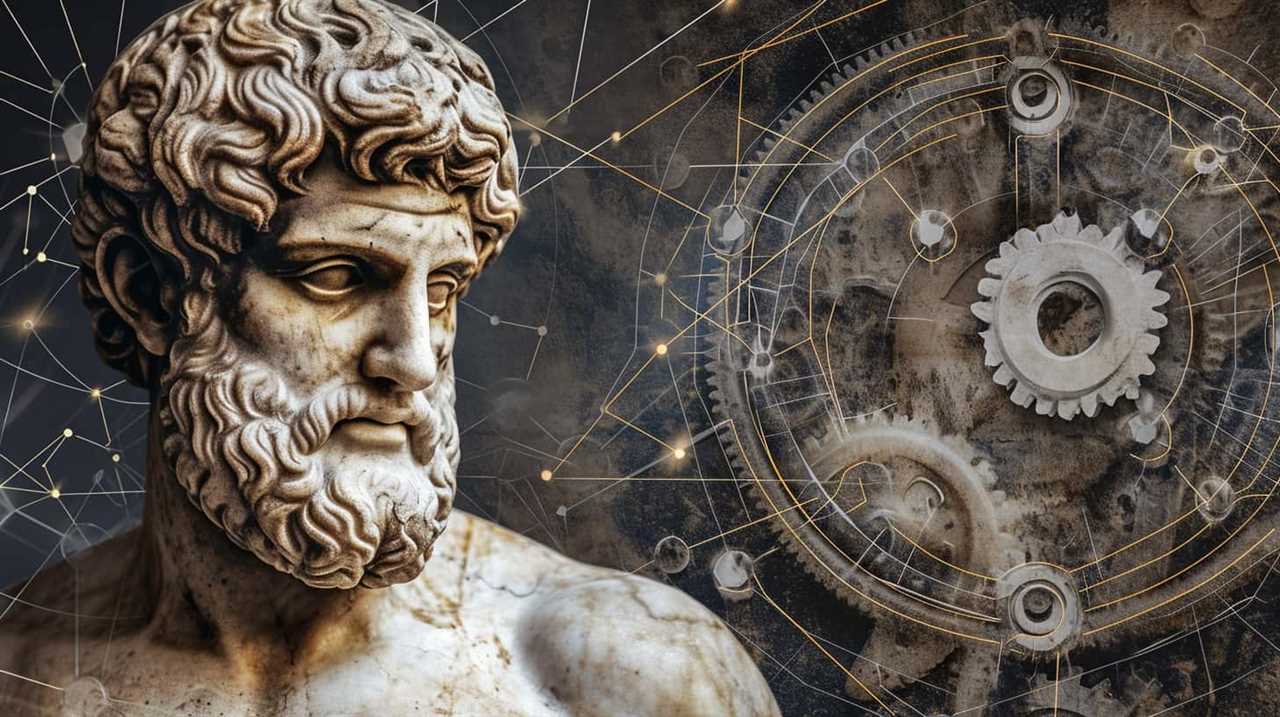Have you ever wondered what Eastern philosophers have to say about consciousness? Well, let me tell you, it’s mind-blowing!
Eastern philosophers, with their profound insights and innovative perspectives, offer a fresh approach to understanding the nature of consciousness.
For instance, imagine a world where we perceive ourselves as interconnected beings, where the boundaries of the self dissolve, and the present moment becomes our ultimate reality. Eastern philosophers teach us that consciousness is not just an illusion, but a profound force that shapes our existence.
They explore the intricate relationship between the mind and body, and delve into the concept of karma and its impact on consciousness.
Through their wisdom, they guide us towards self-realization and the path to enlightenment.
Get ready to expand your mind and explore the depths of Eastern philosophy on consciousness!
Key Takeaways
- Consciousness is interconnected with the larger fabric of the universe.
- The self is viewed as an interconnected part of the larger cosmic whole.
- Eastern philosophers view consciousness as an illusion.
- The path to enlightenment involves cultivating compassion, empathy, and selflessness.

The Nature of Consciousness
In exploring the nature of consciousness, we find that Eastern philosophers offer profound insights into its essence and workings. Understanding awareness and exploring consciousness are central themes in Eastern philosophical traditions such as Hinduism, Buddhism, and Taoism. These ancient traditions provide a unique perspective on the nature of consciousness that can greatly enrich our understanding.
Eastern philosophers emphasize the idea that consciousness isn’t confined to the individual self, but is interconnected with the larger fabric of the universe. They suggest that consciousness isn’t solely a product of the brain, but rather encompasses a universal awareness that pervades all of existence. This perspective challenges the conventional Western understanding of consciousness as solely a product of the individual mind.
Moreover, Eastern philosophers propose that consciousness isn’t a static entity, but rather a dynamic process that’s constantly evolving. They describe consciousness as a continuous flow of thoughts, emotions, and sensations, which arise and fade away in an ever-changing stream. This understanding of consciousness as a process highlights its impermanence and the interconnectedness of all phenomena.

Understanding the Self
As we delve deeper into the exploration of consciousness, Eastern philosophers guide us in understanding the self through their profound insights and teachings. Understanding the self is a fundamental aspect of exploring consciousness, as it allows us to gain insight into our own being and the nature of existence. Eastern philosophers emphasize the importance of self-awareness and self-realization as a means to transcend the limitations of the ego and connect with a higher state of consciousness.
In Eastern philosophies such as Hinduism and Buddhism, the self is seen as more than just the individual ego. It’s viewed as an interconnected part of the larger cosmic whole. Through practices such as meditation and introspection, individuals can cultivate a deeper understanding of their true nature. By quieting the mind and focusing inward, one can observe the thoughts, emotions, and sensations that arise, ultimately leading to a greater sense of self-awareness.
By exploring consciousness and understanding the self, we can break free from the confines of the ego and experience a deeper connection with ourselves and the world around us. Eastern philosophers teach us that the self isn’t fixed or separate, but rather a fluid and ever-changing entity. This understanding allows us to cultivate compassion, empathy, and a sense of interconnectedness with all beings.
Through the exploration of consciousness, we can transcend the limitations of the ego and embrace a more expansive and inclusive sense of self.

Consciousness as Illusion
How do Eastern philosophers view consciousness as an illusion?
Consciousness, according to Eastern philosophers, is often seen as an illusion. This perspective challenges our conventional understanding of the self, perception, and consciousness. It invites us to question the nature of our reality and explore the depths of our existence.
Here are three thought-provoking subtopics that evoke an emotional response in the audience:
- The Illusion of Self: Eastern philosophers argue that our sense of self is merely a construct of our minds. They contend that the ego, or the belief in a separate and enduring self, is an illusion that causes suffering. This challenges the Western notion of individualism and prompts us to examine how our self-identity shapes our experiences.
- Perception and Illusion: Eastern philosophies emphasize the role of perception in creating our reality. They suggest that our senses can deceive us, leading us to perceive an illusory world. This challenges our reliance on our senses as a reliable source of truth and encourages us to question the nature of our perceptions.
- Consciousness as Maya: The concept of Maya in Eastern philosophy refers to the illusory nature of reality. It suggests that our consciousness constructs a world that isn’t inherently real. This challenges our notion of objective reality and invites us to explore the nature of consciousness itself.
In exploring these subtopics, Eastern philosophers invite us to question our fundamental assumptions about the nature of self, perception, and consciousness. By challenging the illusions that shape our understanding of reality, they offer a fresh perspective that encourages innovation and deep introspection.

The Interconnectedness of All Things
Continuing from the previous subtopic, Eastern philosophers emphasize the inherent interconnectedness of all things. They argue that the perception of separation is merely an illusion, and that in reality, everything is interconnected in a profound and fundamental way. This concept of interconnectedness has important implications for our understanding of consciousness and the human experience.
| Interconnectedness and Mindfulness | The Illusion of Separation | Oneness |
|---|---|---|
| Eastern philosophers stress the importance of mindfulness as a means of recognizing the interconnected nature of reality. By cultivating a state of awareness and presence, individuals can develop a deeper understanding of the interdependent relationships that exist between themselves and the world around them. | The notion of separation is seen as a false construct created by the human mind. Eastern philosophers argue that this illusion of separation leads to suffering and a sense of disconnection from others and the world. | The ultimate goal is to realize the state of oneness, where the boundaries between self and other dissolve, and a profound sense of unity is experienced. This state of oneness is often described as a transcendent and blissful state of being. |
Embracing the present moment is a natural extension of recognizing the interconnectedness of all things. By fully immersing ourselves in the present, we can become more attuned to the interdependent web of existence and experience a deeper sense of connection and fulfillment. This shift in perspective allows us to let go of attachment to the past or worries about the future, and instead embrace the richness of the present moment.

Embracing the Present Moment
Our understanding of consciousness deepens when we embrace the present moment, recognizing the interconnectedness of all things. Embracing mindfulness and present moment awareness allows us to fully immerse ourselves in the here and now, experiencing life as it unfolds without the distractions of past regrets or future anxieties. This practice invites us to let go of our incessant mental chatter and engage with the world in a more authentic and meaningful way.
When we embrace the present moment, we cultivate a sense of gratitude for the simple pleasures of life. We become more attuned to the beauty that surrounds us, whether it’s the gentle sway of a tree in the breeze or the warmth of the sun on our skin. This awareness helps us appreciate the richness and depth of every experience, fostering a sense of wonder and awe.
Embracing the present moment also allows us to develop a deeper connection with ourselves and others. By being fully present in our interactions, we can listen and empathize with greater compassion and understanding. This fosters stronger relationships, as we become fully engaged and attentive to the needs and emotions of those around us.
In embracing the present moment, we open ourselves up to the limitless possibilities of the now. We let go of attachments to past identities and future expectations, freeing ourselves to explore new ideas and approaches. This mindset of openness and curiosity enables us to tap into our creative potential and find innovative solutions to the challenges we face.
Transitioning into the next section, by transcending the ego, we can further expand our understanding of consciousness and its infinite potential.

Transcending the Ego
Transcending the ego is a central concept in Eastern philosophies that emphasizes the illusionary nature of the ego and the path to selflessness and enlightenment. Eastern philosophers argue that the ego, or the sense of a separate self, is a construct of the mind and not an inherent reality.
Ego as Illusion
Sometimes, we mistakenly believe that our ego is a fixed and unchanging entity, but Eastern philosophers challenge this notion by emphasizing the impermanence and illusory nature of the ego. They invite us to question the idea that our ego defines our identity, encouraging us to break free from its limitations and explore the true nature of consciousness.
Consider the following emotional responses:
- Confusion: How can something we’ve identified with for so long be illusory?
- Fear: What’ll happen to our sense of self if we let go of the ego?
- Liberation: Breaking free from the ego opens up the possibility of experiencing a deeper connection to the world and others.
Selflessness and Enlightenment
Eastern philosophers emphasize the transcendent nature of selflessness and enlightenment, inviting us to explore the depths of consciousness beyond the confines of the ego. They believe that true liberation and enlightenment can only be achieved by letting go of attachments and desires, ultimately transcending the ego and realizing our inherent interconnectedness with all beings. This journey towards selflessness and egolessness requires a deep understanding of the impermanence of all things and a willingness to detach ourselves from the illusions of the material world. Eastern philosophies teach us that the ego, with its constant need for validation and identification, is the root cause of suffering. By letting go of the ego, we can experience true freedom and liberation from the cyclic patterns of desire and suffering.
| Selflessness and Enlightenment | Letting go of Attachments and Desires |
|---|---|
| Transcending the Ego | Realizing our Inherent Interconnectedness |
| Liberation and Enlightenment | Detaching ourselves from the Illusions of the Material World |
| The Ego as the Root Cause of Suffering | True Freedom and Liberation from Desire and Suffering |

The Role of Meditation
When it comes to understanding consciousness, Eastern philosophers emphasize the role of meditation. Through the practice of meditation, individuals can cultivate self-awareness, allowing them to observe their thoughts and emotions without judgment or attachment.
This process of self-reflection and introspection enhances consciousness by helping individuals detach from the ego and gain a deeper understanding of their true nature. By engaging in regular meditation, one can develop a heightened state of consciousness and experience a greater sense of clarity and inner peace.
Meditation and Self-Awareness
Through the practice of meditation, we can cultivate self-awareness and gain a deeper understanding of our consciousness. Mindfulness practice and introspection techniques play a crucial role in this process, allowing us to explore the inner workings of our minds and unravel the mysteries of the self.
As we engage in meditation, we become more attuned to our thoughts, emotions, and bodily sensations, creating a space for self-reflection and self-discovery. This heightened self-awareness enables us to observe our unconscious patterns and attachments, and ultimately, transcend them.
Enhancing Consciousness Through Meditation
By engaging in meditation, we can enhance our consciousness and expand our understanding of the self. Meditation, rooted in Eastern philosophies, offers a pathway to inner transformation and heightened self-awareness. Through mindfulness practices, we can cultivate a deeper connection with our thoughts, emotions, and sensations, allowing us to observe them without judgment or attachment. This heightened state of awareness enables us to recognize the impermanence and interconnectedness of all things, leading to a greater sense of compassion and empathy towards ourselves and others.
| Mindfulness Practices | Inner Transformation |
|---|---|
| Focused Attention | Expanded Awareness |
| Body Scan | Self-Reflection |
| Loving-Kindness | Non-Dual Awareness |
These mindfulness practices serve as tools to navigate the complexities of our minds and tap into our innate wisdom. As we engage in regular meditation, we gradually strip away the layers of conditioning, biases, and limiting beliefs, revealing our true nature and allowing for a profound transformation of consciousness. Through the practice of meditation, we embark on a journey of self-discovery, expanding our consciousness and gaining insight into the interconnectedness of all beings.

Mind-Body Connection
Exploring the mind-body connection, Eastern philosophers emphasize the interdependence of our mental and physical states. They believe that the mind and body aren’t separate entities, but rather interconnected aspects of our being. This perspective highlights the importance of mind-body integration for achieving holistic well-being. Eastern philosophers offer insightful perspectives on the mind-body connection, which can inspire innovation in our understanding of consciousness.
Consider the following emotional responses that arise when contemplating the mind-body connection through an Eastern lens:
- Awe: Eastern philosophy invites us to marvel at the intricate interplay between our thoughts, emotions, and physical sensations, revealing the profound complexity of our existence.
- Empowerment: Recognizing the mind-body connection allows us to take an active role in cultivating our well-being, as we understand that our mental and physical states influence each other.
- Harmony: Eastern philosophers encourage us to seek balance and harmony between our mind and body, recognizing that this integration contributes to a sense of wholeness and overall well-being.
As we delve into the concept of karma and consciousness, we’ll explore how Eastern philosophers connect the mind-body connection to the broader understanding of our actions and their consequences.

Karma and Consciousness
Continuing our exploration of the mind-body connection, Eastern philosophers emphasize the role of karma in shaping our consciousness. Karma, a concept deeply rooted in Hindu and Buddhist traditions, is the idea that our actions have consequences that extend beyond our current lifetime. It is believed that every action we take, whether positive or negative, creates a karmic imprint on our consciousness. These imprints influence our thoughts, emotions, and behaviors, ultimately shaping our understanding of the self.
To better understand the relationship between karma and consciousness, let’s examine a 2×4 table that highlights key aspects:
| Karma | Consciousness | |
|---|---|---|
| 1. | Result of our actions | Awareness of one’s thoughts and self |
| 2. | Creates karmic imprints | Influenced by past karmic imprints |
| 3. | Determines future outcomes | Shaped by karmic imprints |
| 4. | Can be transcended | Can be expanded and transformed |
In this table, we can see that karma and consciousness are intertwined. Our actions, whether good or bad, leave an imprint on our consciousness, which in turn influences our understanding of ourselves and the world around us. By cultivating positive karma through virtuous actions, we can shape our consciousness in a way that leads to personal growth and a deeper understanding of the self.
Eastern philosophers emphasize the importance of understanding and taking responsibility for our actions, as it is through this awareness that we can transcend negative karmic imprints and expand our consciousness. By recognizing the interconnectedness of karma and consciousness, we can strive for a greater sense of self-awareness and ultimately lead more fulfilling lives.

Non-Duality and Unity
Eastern philosophers emphasize the concept of interconnectedness to explain the relationship between consciousness and non-duality. In their non-dualistic perspective, consciousness and perception aren’t separate entities but rather interconnected aspects of our experience. This view challenges the Western notion of a separate self, highlighting the interconnected nature of all things.
To understand the significance of non-duality and unity, consider the following emotional responses:
- Awe: Recognizing the interconnectedness of all beings and phenomena can evoke a sense of wonder and awe at the vastness and complexity of existence.
- Empathy: Embracing non-duality can cultivate empathy by reminding us that the suffering and joy of others are intimately connected to our own experiences.
- Liberation: The realization of non-duality can lead to a sense of liberation from the constraints of ego, allowing us to experience a deeper sense of interconnectedness and freedom.
In this non-dualistic perspective, the boundaries between self and other, subject and object, dissolve. This understanding invites us to transcend limited perspectives and embrace a more holistic and interconnected way of being.

Finding Enlightenment Through Self-Realization
Through self-realization, we can attain enlightenment and gain a deeper understanding of consciousness, according to Eastern philosophers. The journey towards self-realization involves finding inner peace and achieving enlightenment, which are fundamental aspects of Eastern philosophies. Eastern philosophers emphasize the importance of introspection and self-reflection as means to uncover our true nature and connect with the essence of consciousness.
To illustrate the process of self-realization, let us consider a simple table:
| Finding Inner Peace | Achieving Enlightenment |
|---|---|
| Meditation | Self-discipline |
| Contemplation | Detachment |
| Mindfulness | Wisdom |
| Self-inquiry | Compassion |
Meditation, contemplation, and mindfulness are practices commonly used to cultivate inner peace. By quieting the mind and focusing inward, we can observe our thoughts and emotions without judgment, leading to a sense of calm and clarity. Self-inquiry involves questioning our beliefs and identities, allowing us to uncover the truth about ourselves and our connection to the universe.
Achieving enlightenment is closely related to finding inner peace. It requires self-discipline, detachment, wisdom, and compassion. Self-discipline helps us overcome distractions and cultivate a focused and balanced mind. Detachment allows us to let go of attachments and desires, leading to freedom from suffering. Wisdom comes from understanding the impermanence and interconnectedness of all things. Lastly, compassion enables us to extend understanding and kindness to ourselves and others.

Frequently Asked Questions
How Does Eastern Philosophy Define Consciousness?
Eastern philosophy offers a unique perspective on consciousness, emphasizing the mind-body connection and the role of meditation in expanding awareness. It provides insights into the nature of consciousness that can inspire innovation in our understanding of the mind.
What Are the Different Perspectives on the Nature of the Self in Eastern Philosophy?
Different views on the concept of self in Eastern philosophy are diverse and complex. They range from the belief in an interconnected, non-dualistic self to the idea of a constantly changing, impermanent self.
How Does Eastern Philosophy View the Concept of Illusion in Relation to Consciousness?
In Eastern philosophy, the concept of illusion in relation to consciousness is a fascinating topic. We delve into the intricate relationship between Eastern philosophy and the illusory nature of consciousness, exploring profound insights and thought-provoking perspectives.
Can Eastern Philosophy Explain the Interconnectedness of All Things in Terms of Consciousness?
In exploring the interconnectedness of all things, Eastern philosophy offers a unique perspective on consciousness. It delves into the idea that consciousness is not limited to individual beings, but rather extends to the collective consciousness of the entire universe.
How Does Eastern Philosophy Suggest Embracing the Present Moment Can Enhance Consciousness?
Embracing mindfulness allows us to cultivate awareness of the present moment, enhancing our consciousness. By focusing on the here and now, we can deepen our understanding of ourselves and the interconnectedness of all things.

Conclusion
In the realm of Eastern philosophy, consciousness is seen as a complex and multifaceted concept. It’s understood as the essence of our being, intricately connected to the self and the world around us.
Through self-realization and a deep understanding of interconnectedness, one can attain enlightenment and transcend the illusions of the mind.
Ultimately, Eastern philosophers teach us that consciousness isn’t just a personal experience, but a profound connection that unites all living beings in a harmonious web of existence.









